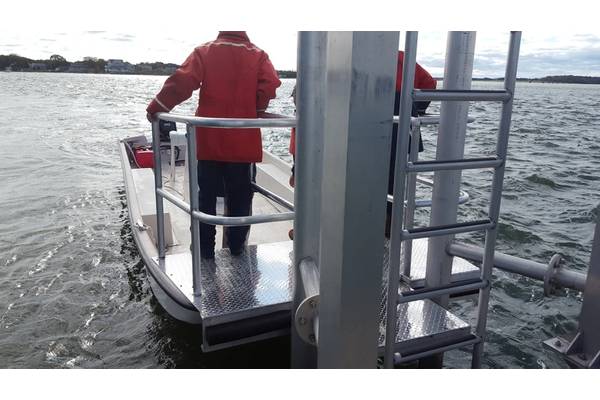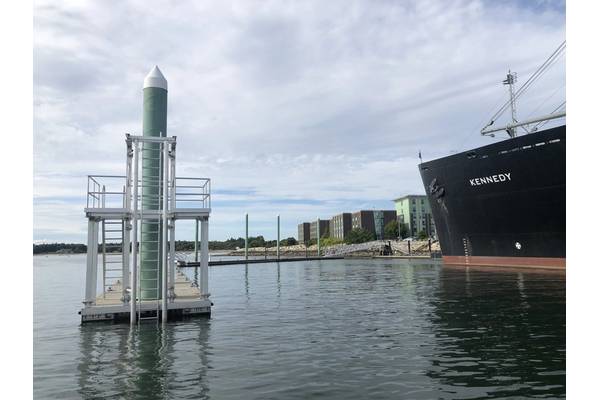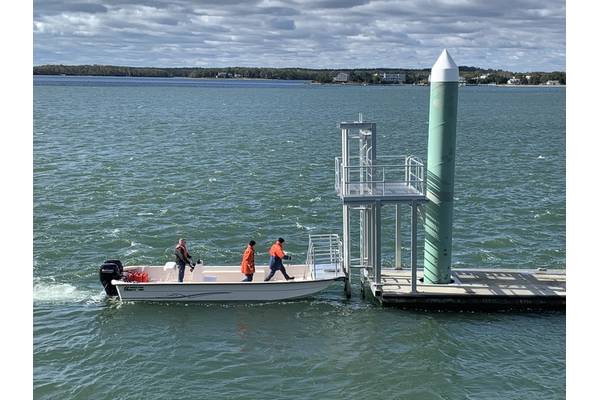


Baker-Polito Administration Celebrates the First-in-the-Nation Offshore Wind Training Facility Located at Massachusetts Maritime Academy. MMA steps out in front to train the professionals who will make the coming wave of domestic offshore wind.
Today, Governor Charlie Baker, Lt. Governor Karyn Polito, Secretary of Energy and Environmental Affairs Kathleen Theoharides, and Stephen Pike, CEO of the Massachusetts Clean Energy Center, joined officials from the Massachusetts Maritime Academy to launch the first-in-the-nation offshore wind crew transfer training facility. The group of state and college representatives officially christened the training vessel as part of the 2nd Annual Massachusetts STEM Week.
The training facility, which received a total of $1.73 million from the Administration and Massachusetts Clean Energy Center (MassCEC), will provide education, training and certification to thousands of residents, including Mass Maritime cadets, as well as skilled labor including electricians, pile drivers, divers and welders, enabling them to work in the emerging offshore wind industry. The training facility represents a significant investment by the Commonwealth to grow a workforce for the offshore wind industry, which will support the construction and operation of Vineyard Wind’s 800-megawatt project, which was selected by the Commonwealth’s Electric District Companies in May 2018 under the state’s first competitive procurement for offshore wind.
“As Massachusetts heads toward building the first large scale offshore wind project in the nation, we are pleased that Massachusetts Maritime Academy will be home to this first-in-the-nation training facility,” said Governor Charlie Baker. “With important training infrastructure like this crew transfer facility, thousands of students and trade workers will gain the skills and knowledge necessary to be a part of the growing sector of Massachusetts’ nation-leading clean energy industry and can take advantage of the highly-skilled jobs created by this emerging industry.”
“Offshore wind is a crucial part of our administration’s climate strategy, and it is vital that we have a skilled workforce ready for jobs that will bring new opportunities to many residents in the Commonwealth,” said Lt. Governor Karyn Polito. “We are grateful to Massachusetts Maritime Academy for their partnership in its development of this training facility and its continued collaboration to ensure Massachusetts workers have the necessary certifications, credentials and safety training to build these projects and lead us to a clean energy future.”
The project is a partnership between Mass Maritime, state government and industry, including Vineyard Wind. Prior to today’s opening of the Mass Maritime training facility, there was no other organization in the United States accredited to provide a full safety training program required for workers in offshore wind. The offshore wind training facility provides critical infrastructure that will give both college students and adults seeking new careers the necessary skills and certification to work in the emerging industry.
MassCEC awarded Mass Martime an initial $50,000 grant for a feasibility study related to the construction of this facility, which was followed by a $500,000 grant in 2017 to support the construction of the crew transfer training facility and vessel. In May, through MassCEC’s Offshore Wind Workforce program, Mass Maritime received $184,000 to establish all five modules of the Global Wind Organization’s basic safety training and to develop an “Introduction to Offshore Wind” course for Mass Maritime students. Mass Maritime also received a $1 million grant from the Seaport Economic Council in 2017 to support the construction of the facility’s pier.
In total, Massachusetts Maritime Academy received more than $1.73 million in grants from the Baker-Polito Administration and MassCEC to support the development of its first-in-the-nation facility and basic safety program.
“Offshore wind is vital to the Baker-Polito Administration’s efforts to reduce the Commonwealth’s greenhouse gas emissions and provide residents with clean, reliable energy,” said Secretary of Energy and Environmental Affairs Kathleen Theoharides. “By partnering with local academic institutions like Mass Maritime, we are able to support essential training facilities that will help position the Commonwealth has a hub for this emerging industry and ensure Massachusetts workers can take advantage of new local jobs.
“Massachusetts Maritime Academy is a unique institution with a long history of preparing students for the jobs of the future. It is now poised to educate both students and adults for highly-skilled jobs in the offshore wind energy industry. We are very excited to see MMA jump into educating Massachusetts residents for these future jobs,” said Secretary of Education James Peyser.
“Massachusetts Maritime Academy has been educating mariners and energy engineers for more than a century, so we are best positioned to support this important initiative for the Commonwealth and the nation,” said President of Massachusetts Maritime Academy Rear Admiral Francis X. McDonald, USMS. “The grants MMA received helped us improve our facilities and create the training that is needed to ensure that graduates and adult learners are ready for the critical jobs in the offshore wind industry.”
“Offshore wind will create thousands of clean energy jobs and our goal is to make sure Massachusetts workers have the specific trainings and certifications necessary to work in this industry and build these major infrastructure projects,” said MassCEC CEO Stephen Pike. “We are pleased to support Mass Maritime on this project as strategic partnerships with our local academic and training institutions are mission critical to developing a workforce ready and able to meet the needs of this emerging industry.”
The U.S. Department of Energy estimates 43,000 new jobs will be created in the offshore wind market by 2030. The Massachusetts Clean Energy Center recently published an assessment of jobs and economic impacts associated with development of 1,600 megawatts in Massachusetts. That study estimated that over the next decade, offshore wind farms will create 2,000 - 3,000 jobs and generate economic impacts between $1-$2 billion in the region.
The crew transfer training facility is a critical component of a comprehensive safety training program to be offered by Mass Maritime. The facility supports safety training for workers moving from relatively small crew transfer vessels to the fixed support structures of wind turbines in the open seas.
“Vineyard Wind is excited to partner with the Baker-Polito Administration, Mass Maritime and other academic institutions to invest in workforce training and safety programs that will be crucial to a successful U.S. offshore wind industry,” said Vineyard Wind CEO Lars Thaaning Pedersen. “We look forward to Mass Maritime’s first-in-the nation training facility serving as a catalyst for developing an American-led workforce equipped with the skills to lead offshore wind projects up and down the east coast for years to come.”
“Massachusetts Maritime Academy is one of the state’s most prestigious institutions so to have this commitment in GWO standards made by them is great news for U.S. offshore wind and the East Coast workforce. Our members want new recruits and contractors to arrive on day one at a wind power installation with a recognized basic minimum level of safety and technical training that they can verify online,” said Brian Walencik, of GE Renewable Energy and Chairman of the GWO North America Committee. “By opening a GWO standard facility, training people to GWO standard and uploading training records to the WINDA database, MMA is delivering huge additional value to every manufacturer, developer and supplier building American offshore wind.”
Initially, MMA will focus on Basic Safety Training for the offshore wind industry with a course comprised of five modules: First Aid, Manual Handling, Fire Awareness, Working at Heights, and Sea Survival. Some of the training will take place in MMA’s newly constructed indoor climbing facility and on the Crew Transfer Training Facility located on the MMA’s pier in Buzzard’s Bay. Instructors will teach students how to safely transfer from the vessel to an offshore wind turbine. MMA partnered with the largest provider of GWO training in the world, Relyon Nutec, to help train MMA instructors to deliver these courses using GWO-approved and globally recognized curriculum.